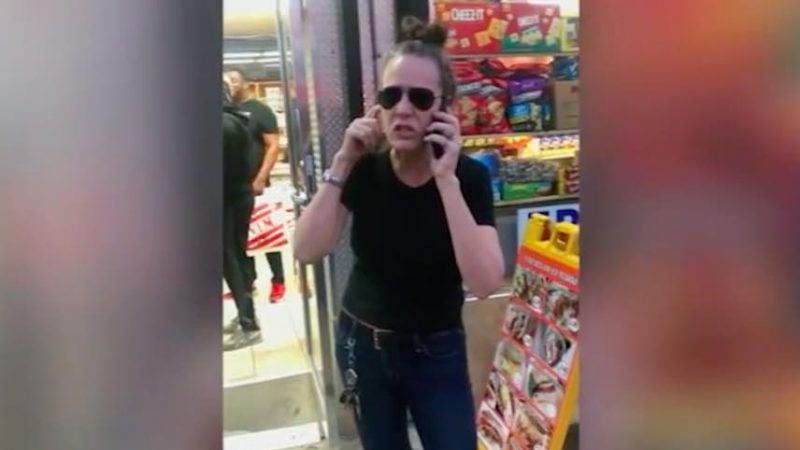A White Woman Falsely Accused a Black 9-Year-Old Boy of Groping Her
Surveillance footage disproves her allegations-and reminds everyone not to automatically believe victims.


A cell phone video of a white woman calling the cops on a nine-year-old black boy outside a Brooklyn convenience store went viral on social media last week. In the video, the woman—nicknamed "Cornerstore Caroline" on Twitter—claims that kid grabbed her butt while she was in line at the store.
Now surveillance footage from inside the store has been released, and it proves that the boy did no such thing. The accusation was, without question, 100 percent false.
The woman offered an apology after viewing the surveillance footage, though some have questioned her sincerity.
The original video—in which the woman can be seen on the phone with a 911 dispatcher as the boy cries and his mother argues with her—was viewed more than 5 million times. Many sympathized with the young boy, wondering what kind of person would immediately involve law enforcement in a matter involving a child.
The surveillance footage explicitly disproved the woman's account. It clearly showed the boy walking past the woman without touching her. His backpack grazed her body, prompting her freakout.
NEW: Surveillance footage proves white woman who called 911 on a young black child claiming he groped her - was wrong @PIX11News #CornerstoreCaroline Full story at 5 pic.twitter.com/agTK0MpgUG
— Andrew Ramos (@AndrewRamosTV) October 12, 2018
If we're being maximally charitable to the woman, she didn't outright lie—she was just deeply mistaken about what happened, and eager to weaponize her error against a kid's future.
I couldn't help but notice a perceptive first comment on the writeup of this incident at The Root, a progressive news site that covers race issues. It reads: "Serious question. How do we square the idea that women don't make false accusations and should be believed, with the fact that white women have used false accusations as weapons against black men, and black people generally throughout this country's history?"
This is a good question that should vex more people on the left. Many fourth-wave feminists contend that women who make allegations of sexual misconduct must always and automatically be believed. The #MeToo movement, in their view, is an opportunity not just to hold powerful abusers accountable but to re-balance the scales of justice to reflect the idea that false accusations are virtually nonexistent.
This deeply illiberal approach rests on the assumption that false accusations are so uncommon as to be practically ignorable. But in truth, we can't definitively say that false allegations are as low as 2–8 percent, the statistic often cited by activists. The available data are flawed and unreliable. (Some allegations are technically false but impossible for the police to explicitly disprove; the infamous Rolling Stone/University of Virginia gang rape hoax, for instance, would not be counted as false in any police database.) It also turns Western notions of justice on their head. Even if most accused men are guilty of sexual assault, that doesn't mean we should rush to judgment in each individual case.
"Even as we must treat accusers with seriousness and dignity, we must hear out the accused fairly and respectfully, and recognize the potential lifetime consequences that such an allegation can bring," writes Emily Yoffe in an Atlantic article about the fallout from the Brett Kavanaugh hearings. "If believing the woman is the beginning and the end of a search for the truth, then we have left the realm of justice for religion."
We should expect the formal arbiters of justice—police, prosecutors, judges, juries, etc.—to take an even-handed approach to such cases. And we should want the informal arbiters of justice—media, activists, the broader public—to exercise some degree of caution. An activist culture at war with the principles of due process and the broader presumption of innocence is a bigger threat to black convenience-store kids as it is to rich and powerful men. Justice for victims must not come at the expense of fairness for the accused.



Show Comments (196)